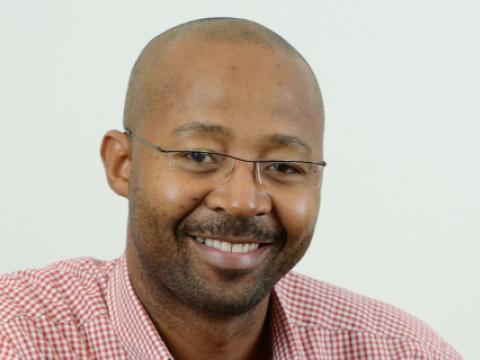Dr. Monwabisi Ralarala: Linguistic rights expert

We spoke to Canon Collins alumnus Dr. Monwabisi Ralarala about his pioneering work in the field of linguistic rights in South Africa.
He outlines how he wishes to see the criminal justice system reformed, his academic and professional hopes for the future, and how he sees his work contributing to social change.
What is the importance of being a language specialist in a multilingual society like South Africa?
Conceptualising and understanding the rights of disadvantaged communities and minorities, insofar as their education, language and culture are concerned, remain pertinent and thorny issues in South Africa. As an aspiring agent of change, I am confident that my credentials as a language specialist stand me in good stead to advocate for linguistic human rights in the nation’s education and criminal justice systems.
What inspired you to pursue a career in this field?
After graduating from high school, I enrolled at the University of the Western Cape for a Higher Diploma in Education and later qualified as a teacher. I came to realise that there was a need, based on assessment and performance, to take a closer look at the academic literacy and language needs of learners who were second-language English speakers. This was one of the knowledge gaps that triggered my interest in language studies.
My interest was further developed when I enrolled in the University of Cape Town and, under the mentorship of Professor Russell Kaschula, began to research Sociolinguistics and Multilingualism. Since then I have never stopped educating and empowering myself; I studied part-time at various universities, including at Stellenbosch where I got appointed as a junior lecturer and obtained my PhD in 2010. I received a second PhD in Translation and Forensic Linguistics in 2015 from the University of the Free State on a Canon Collins Trust scholarship.
How did your Canon Collins scholarship help you to achieve your academic and career objectives?
When I started my PhD, I set out specific goals that I was determined to achieve. These included strengthening my research skills, increasing my research output, developing collaborative relationships in my niche area, and lastly, reinforcing my contribution in support of linguistic communities.
Most of my academic goals have been achieved through the support of the Canon Collins scholarship. For example, through attending international conferences I have forged collaborative relationships and synergies with colleagues from around the world and have co-authored papers for publication in international linguistics journals.
My advocacy work in linguistic and legal communities is also gaining momentum. Apart from advocating for the recognition of cultural and linguistic rights in the legal sphere through my scholarly work, the findings and recommendations of my research are now beginning to instigate wider dialogue and debate on the topic of situating language rights within the framework of Human Rights. In particular, I am concerned with the rights of African languages and the rights of those languages during the construction of police records and court proceedings. My input into this ongoing dialogue has been featured in the media.
What is your greatest professional accomplishment to date?
Completing my second PhD research journey in Forensic Linguistics/Translation Studies has been very fulfilling and enriching over the last three years. From this research, four papers that deal with both police record construction and courtroom discourse have been published in accredited journals. On the basis of my academic achievements and other community development projects I was recently promoted to the position of Associate Professor and Institutional Language Coordinator at the Cape Peninsula University of Technology. Additionally, I am honoured to serve as Chairperson of the Western Cape Provincial Language Committee and as a Linguistic Human Rights Commissioner in South Africa.
What do you see yourself doing in the future?
In relation to my academic leadership and the future, I’m involved in a mentorship programme which is meant to upskill and provide academic support to graduate students and staff who are enrolled for MA and PhD programmes in the field of linguistics.
My other plans for the future are mainly research based. I plan to make my research findings more broadly accessible and visible to the public. Publicising these findings will hopefully attract the attention of policy makers in the legal fraternity and influence language policy in the criminal justice system.
I hope to convert my dissertation and have it published as a book. Central to the plan is to develop and deliver training material for police officers which is fore-grounded in language and communication, and thus improving their skills and abilities in record construction.
I will also be an advocate of leveraging new technologies to overcome linguistic problems plaguing the South African criminal justice system. The entire issue of evidentiality currently rests on handwritten, sworn statements translated from African languages into English by police. This archaic system is characterised by flaws and is open to manipulation and distortion. It is my intention to work with progressive structures and interest groups to reinforce the usage of emerging technologies to remedy these shortcomings.
How do you see yourself contributing to social change?
Aside from advocating for the Rights of Language and the Right to a Language, as a Linguistic Human Rights Commissioner, I’m involved in the reviewing of linguistic violation cases. A classic example is a case of an attempted rape in which a deaf and dumb woman was allegedly a victim: State vs Siwaphiwe Sikhafungana. The idea is to establish interventions on the basis of this case study and other related cases, and thus make a difference in society and to the lives of vulnerable people, as there are presumably many of such similar cases that are not reported. For me this is a classic example meant to contribute to the notion of social change, and thus promoting social justice.
You can support Canon Collins scholars like Dr. Ralarala to make a tangible difference in their communities by donating to the Trust here.
